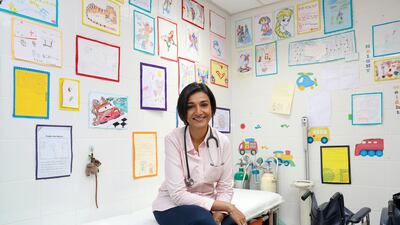As children prepare for the first day of term, teachers and doctors are waging a war on caffeinated energy drinks being used by pupils as young as 10.
Deira International School in Dubai has had its revolutionary approach to healthy eating praised by doctors but staff there claim they are fighting a losing battle in encouraging children to dump sports drinks such as Red Bull.
Some are swigging highly caffeinated drinks as a substitute for a healthy breakfast, and teachers have said that is impacting the classroom.
“Some children are replacing the need for a good breakfast with a caffeine kick, and it is something we are actively monitoring,” said Dr Sadaf Jalil Ahmed, the school doctor and healthy eating co-ordinator.
“Children will deny they are drinking Red Bull and other drinks but we know they are. I’ve seen children pouring it into flasks so I don’t catch them drinking it.
“They are not allowed to bring canned drinks to school. That was shut down when we had repeated incidents of children drinking in school.
“We can police them for the eight hours they are in school but when they go home for the remaining 16 hours they can often do what they want.”
Although such drinks are subject to a 100 per cent price increase in October, due to a new excise tax coming into force, staff fear that will do little to deter children, many of whom are from affluent families.
____________________
Read more:
Energy drinks to double in price
Call for fewer unhealthy options in school canteens
____________________
“I don’t think the taxation will make much difference in the socio-economic class that I’m addressing,” Dr Ahmed said.
“Children are regularly drinking Red Bull by the age of 12, and I’ve had parents who are both doctors send their 10-year-old child into school with a Red Bull in their lunchbox.
“It makes them hyperactive, and they exhibit signs of Attention Deficit and Hyperactivity Disorder (ADHD) and become fidgety in class.”
Too much caffeine can cause jitteriness and nervousness, an upset stomach, headaches, difficulty concentrating and sleeping and an increased heart rate and blood pressure - especially in young children.
Caffeine is also a diuretic, causing the body to eliminate water through urination, which may contribute to dehydration.
Drinking too many sweetened caffeinated drinks can also lead to dental cavities, or caries, from the high sugar content and the erosion of the enamel of the teeth from acidity.
“Caffeine isn't a nutrient, like calcium or iron, so you don't need a certain amount to be healthy,” said Dr Janki Panchal, a specialist paediatrician at Aster Clinic, Al Barsha.
“No one needs caffeinated drinks, especially kids. The best drinks for kids are water, fruit juice and milk, which don't contain caffeine.”
Dr Ahmed spends her early mornings policing the corridors of Deira International School checking the lunchboxes of the early years’ pupils. Her attention then switches to the cafeteria where her patrols take on one-to-one education with what the children are eating.
Deira International has been selected as one of the top 10 schools in Dubai to take part in a “happiness programme” in November when its healthy-eating habits, creativity, charity and exercise will be used as an example to other schools.
“We find parents are constantly in denial and want us to believe their children are eating well and have a balanced diet at home,” Dr Ahmed added.
“Even in adults, you can never predict when you can have a sudden cardiac death and we have seen an overindulgence in these drinks linked to heart problems, particularly in young people.
“My aim is to make changes at the base level with primary school children, so they can develop good habits.”
Energy drinks can contain up to 240 milligrams of caffeine, according to a 2012 Consumer Reports study.
In April, American teenager Davis Allen Cripe died of a caffeine-induced cardiac event two hours after bingeing on drinks. He had collapsed after suffering a probable heart arrhythmia after drinking a cafe latte, a large Diet Mountain Dew and an energy drink, according to a South Carolina coroner.
“Caffeine and high-energy drinks consumed by children on a regular basis can have a long-term effect on their health,” said Dr Sweta Swaminath, a specialist in general paediatrics at NMC Royal Hospital, in Abu Dhabi.
“They have a high level of sugar, which boosts energy levels in the short term but have no nutritional value otherwise.
“There are no safe levels or recommendations for children to consume caffeine. It is always safer to avoid them altogether.”


